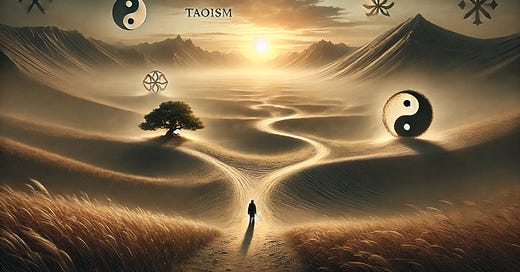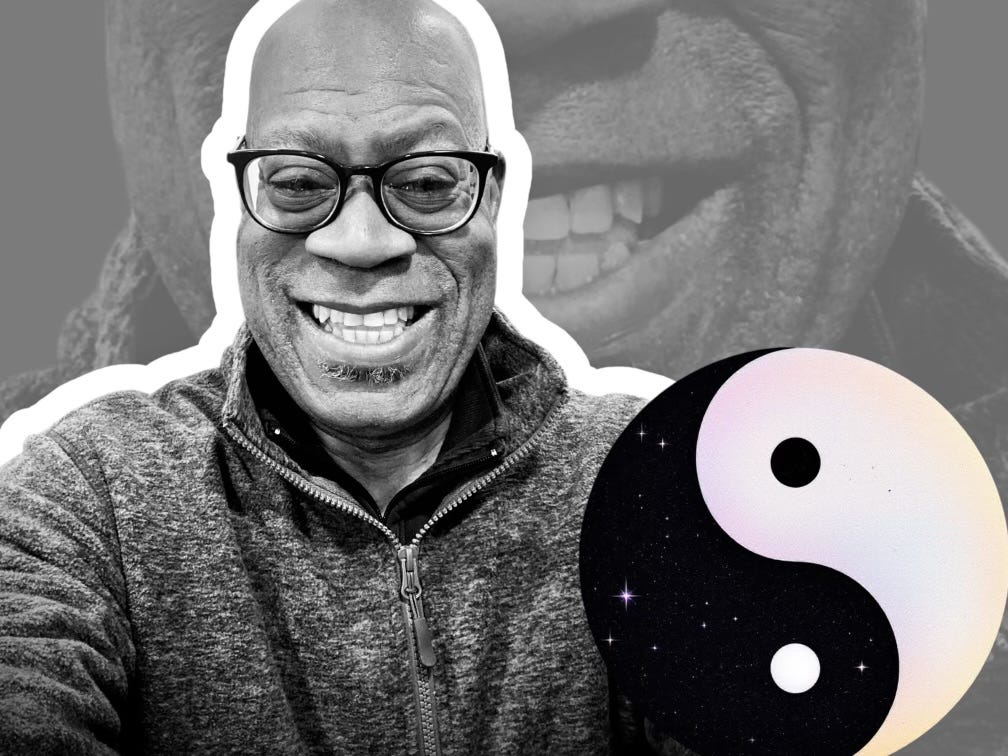I’ve long walked the razor’s edge between being an unapologetic individualist at heart while honoring the need to work collectively with others .
It’s an uneasy dance, particularly in an era where you’re expected to align, comply, and hashtag your allegiance. So when I first encountered Ayn Rand back in the 80’s, it was like discovering a firebrand cousin who refused to say grace at Thanksgiving.
The characters in her book were wildly confident, gloriously self-possessed, and damn near allergic to compromise. But as seductive as her celebration of individual willpower was, I found her vision sterile—almost inhuman.
The problem wasn’t with her veneration of self-interest. It was with her disdain for anything that couldn’t be measured by one’s utility or production.
Selflessness………..
Grace…………………….
Flow………………………
Rand was having none of that.
This tension became more intriguing when I stumbled across Yangism, an obscure Chinese philosophy birthed in the Warring States period. It felt like I was meeting Rand’s ancient Chinese twin.
Founded by the elusive Yang Zhu, Yangism preached the supremacy of the self. “Each one for himself,” Yang declared, and unlike Confucianism or Mohism which stressed duty and order, Yangism claimed the greatest good was preserving one’s xing—a term often translated as “nature,” though it’s far more nuanced.
Xing was seen as the original blueprint of one’s being, unspoiled by society, education, or external moral codes. In modern terms, it was self-sovereignty in the raw. Yangists didn’t believe in martyrdom, in sacrificing the self for the group, or even in rigid altruism.
They held that life was short, and its highest calling was not service, but preservation of one’s own essence. In that, Yangism stands as the East’s truest articulation of philosophical egoism.
And yet, unlike Rand’s cold rationalism, Yangism feels more elemental, more intuitive. It doesn’t ask you to crush others to preserve yourself, just to not lose yourself in others. There’s a difference.
Still, if Yangism is a clarion call to the sovereign self, Taoism offers the soft whisper: let go. Wu wei—non-doing—isn’t about laziness; it’s about alignment. Taoism doesn’t reject self-interest so much as it reframes it. In other words, your nature (xing) isn’t a sword to wield, but a stream to follow.
Don’t chase. Don’t fight. Just flow. There’s something hauntingly beautiful in that. Something I missed when reading Rand’s The Fountainhead, where Howard Roark seems more like a clenched fist than an open palm.
Then there’s Chan Buddhism, which raises the stakes by denying a stable “self” altogether. Individualism? Illusion. Xing? A veil. The ego is a construct, a flicker on the screen of consciousness.
Liberation, according to Chan, comes not from maximizing the self, but from dissolving it. So, now I’m tangled in three competing visions: Rand’s heroic self, Yang Zhu’s natural self, and Chan’s no-self. Which one is right?
Truth is, I contain all three. There are days I want to howl my autonomy into the wind, live boldly, and let the chips fall where they may. Other days, I want to melt into the Tao, surrender to the mystery, and float with no paddle.
And sometimes, in rare quiet moments, I taste the emptiness Chan speaks of—neither asserting nor avoiding, just being. Those moments are fleeting, but profound.
Modern society doesn’t help. Algorithms nudge us into groupthink. Institutions reward obedience. Social media demands performance over presence.
The self is simultaneously inflated and ignored, applauded and annihilated. In this climate, being an individual isn’t rebellion—it’s revelation.
So here’s my modest wisdom, earned not from textbooks but from trudging through this mess of modernity with a soul that resists easy categories:
Don’t abandon yourself trying to belong.
Don’t contort your essence to fit someone else’s blueprint.
And don’t assume your “self” is finished—it’s fluid. Let it breathe.
If Rand gave us a caricature of individualism—sharp edges and no shades—Yang Zhu offered a more organic rendering: self-interest that doesn’t need to dominate, only to endure. Taoism and Chan Buddhism remind us to loosen our grip, even on the self itself.
So maybe the answer isn’t choosing one path. Maybe it’s knowing when to stand alone, when to yield, and when to disappear entirely.
And in the end, maybe individualism isn’t about being separate—but about being sovereign in how we choose to show up in this tangled, beautiful, broken world.
If “The Daily Chocolate Taoist” brings value to your day, consider supporting my work as a paid member or tipping me some dirty chai latte love. No paywalls—just raw, unfiltered Taoist wisdom delivered straight to your inbox. Every contribution helps keep this journey alive, and I deeply appreciate your support!






Well that made me feel the most normal in awhile 🤌🏻😎😘
When I started reading this I thought "Is Andrew Yang a Randist??" haha. I love learning about these different philosophies.
I think Atlas Shrugged is one of the greatest books ever written, but I didn't take it as a moral guidebook of any sorts. I also think The Fountainhead is great, but I've always been surprised by the politics that arose from these works of literature.